“The door is going to open, and I am going to die.”
Amin Dzhabrailov was coloring a woman’s hair when the police arrived. She was a bride to be. He was taken, thrown into the back of the police car, hauled to the station, and subsequently beaten and tortured for what he says was two weeks. After the torture, his brothers arrived to take him home.
“‘You should take away your shame,’” the police said. Dzhabrailov explained in an interview with TIME magazine what they meant. “It was directly meaning ‘You should kill your kids because they are gay and this is shame for Chechnya and for your family.’”
Dzhabrailov is one of the first gay men from Chechnya to speak out against the abuse that has been going on since at least the Spring of 2017. Chechen police have been rounding up gay men in the southwestern Russian republic and subsequently beating, torturing, and coercing them into exposing more men in the gay community. If an accused man survives the authorities, they then go home to face their families, who have been encouraged by authorities to participate in honor killings.
While the list of abuses by Chechen police and authorities – including beatings, electrocution, denying food and water, and even death – show the horrendous nature of the persecution of gay men in Chechnya, Moscow has done little to push for an end to the violence. In fact, Ramzan Kadyrov’s, the Head of the Chechen Republic and a prominent Putin ally, government denies any wrongdoing, dismissing these claims of abuse as absolute lies.
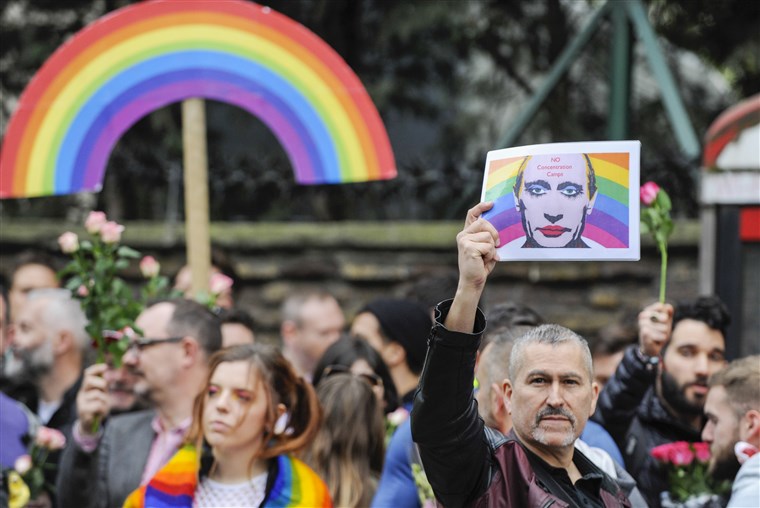
Image Source: NBC News
Despite this dismissal, the UN Human Rights Office of the High Commissioner issued a statement this February calling for Russia to, “ …act urgently to protect the rights of people who are, or are perceived to be, lesbian, gay or bisexual in Chechnya, and investigate allegations of human rights abuses including two reported deaths, say UN rights experts*.” Several other human rights groups like Human Rights Watch and Outright International have also called for further action.
As seen from the two years of inaction since the initial purges, the Russian government has done nothing and will do nothing to stop the persecution of gay men in Chechnya.
Russia’s sphere of influence is growing each year. From the annexation of Crimea in Ukraine to the interference in the 2016 U.S. Presidential election, Putin’s hand is reaching far and beyond Russian borders. The precedent must be set that human rights are a non-negotiable issue in today’s globalized world. If the international community continues to turn a blind eye, gay men in Chechnya will continue to suffer, and a dangerous cycle will be left in place for other minority groups that may fall under Russian influence in the near future.
The ongoing persecution at the hands of the Chechen and Russian governments is a direct violation of the Universal Declaration of Human Rights. It is up to the international community to pressure Putin’s government, effectively in charge of Kadyrov, into condemning and stopping the attacks. Whether through sanctions or boycotts, something must be done before more Chechen men are tortured or killed for loving – or even being suspected of loving – another man.
A turbulent republic under Russian control
To understand the wave of homophobia crashing through Chechnya, it is important to understand the background of the troubled region.
Chechnya is a landlocked territory, surrounded by the Great Steppe to its north, and other Caucasus states to its south. The landscape consists of rolling hills, deep valleys, and a dramatic, yet beautiful skyline. Dating back thousands of years, the Chechen people have been the subject of conquests from groups like the Sumerians, the Mongols, and of course, the Russian crown.
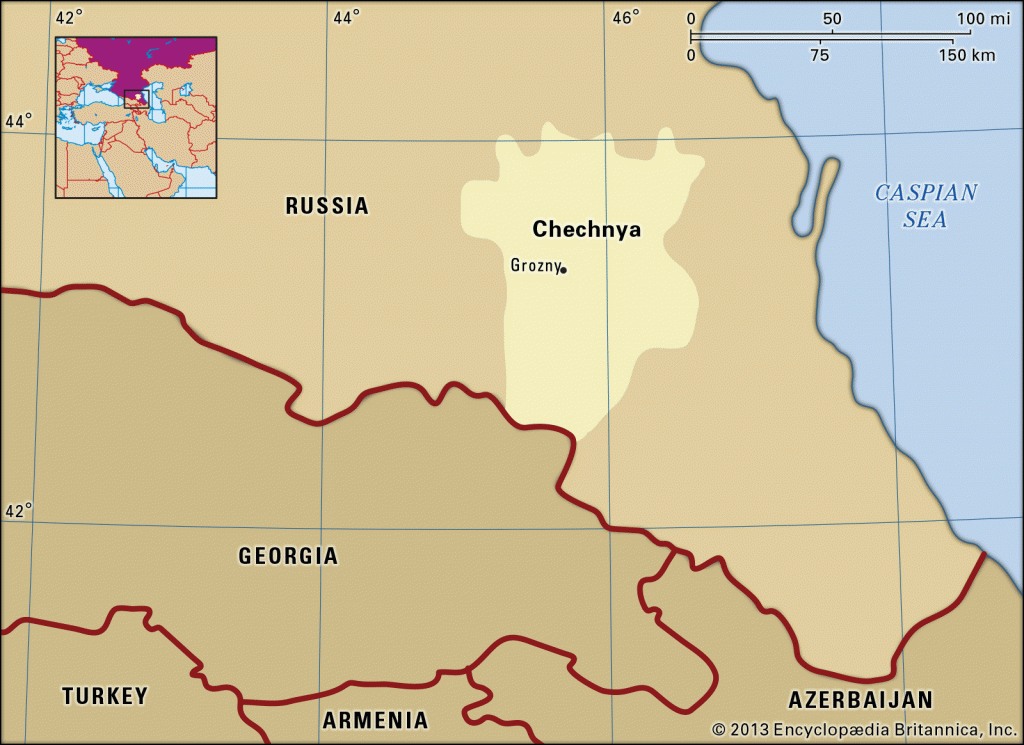
Image Source: Encyclopedia Britannica
In the 18th century, Russian encroachment into the Northern Caucasus, in the name of Christianity, led to the spread of Islam amongst the Chechens as a form of resistance. The Chechens were a relentless force that refused to back down in defense of their homeland, leading to decades of violence in the region.
Following years of resistance, Chechnya was finally conquered by Russia in 1858 after Chechen leaders failed to create an Islamic state. When the Soviets gained power in the 20th century, Chechnya was designated an autonomous region and renamed the Chechen-Ingush Autonomous Soviet Socialist Republic in 1934.
Ten years later, false accusations of Chechen-Nazi collaboration by the Stalinist regime led to the mass deportation of the Chechen and Ingush people to central Asian regions in February 1944. Thousands died while being deported, and those who did not leave were killed. The region of Chechnya was then filled with ethnic Russians. Chechens were eventually allowed back into their homeland in 1957, under the rule of Soviet leader Nikita Khruschev.
After the fall of the Soviet Union in 1991, Chechnya held its own elections, wrote its own constitution, and proclaimed its independence. Russian troops subsequently invaded in 1994, and what followed were two gruesome wars, leaving hundreds of thousands dead. The violence continued until 2009, though a select few Chechen independence groups, including segments of the Islamic State, still exist today.
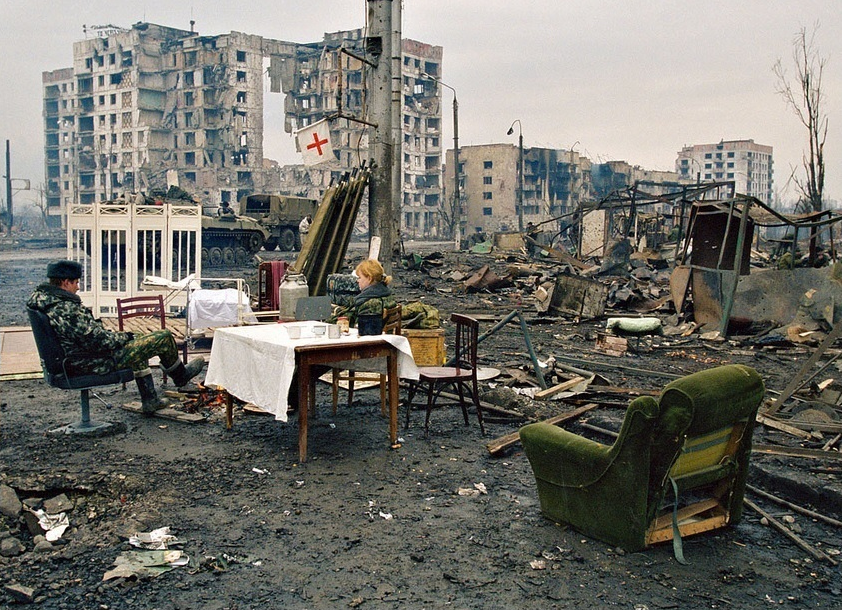
Image Source: Imgur
The homophobic present
The Russians effectively destroyed the Chechen state and secured power of the now officially Russian region. Vladmir Putin appointed Ramzan Kadyrov, the son of the former Chechen president and notable Putin supporter, to be president in 2007. Kadyrov has come to be known as ‘Putin’s foot soldier’, and is infamous for his various human rights abuses surrounding torture, assassinations, corruption, and of course, anti-gay purges.
Homophobia in Chechnya follows an increasingly worrying pattern of homophobic acts from the Kremlin itself. In 2013, Vladimir Putin signed a law banning ‘gay propaganda’ amongst minors. The law passed in Parliament with a vote of 436-0, and made it illegal to equate straight and gay relationships. Another piece of legislation passed made it a crime to ‘offend religious feelings’, and was punishable with up to three years in prison.
The rise of homophobia in Russia can be traced to Putin’s desire for power. After the fall of the Soviet Union, the Russian Orthodox Church gained a second life, with three times as many people identifying as religious in 2012 as compared to 1989. Many wanted to fill the absence the fallen Soviet government created in their lives.
Given the church’s negative stance on same-sex relationships, Putin’s government, in an effort to gain public support, has become increasingly conservative and nationalistic. Policies and national rhetoric zeroing in on ‘traditional’ Russian values have increasingly been used to please the growing religious population.
While Putin’s crusade to gain absolute power in Russia comes to life through conservative, homophobic legislation, Kadyrov’s crusade in Chechnya becomes one through direct, violent action.
“There are no gays in Chechnya”
In 2018, the investigative journal Novaya Gazeta reported that more than 100 men suspected of being gay were tortured, beaten, and starved by the Chechen government. When accused of these human rights violations, a Russian official at the UN stated that these violations were impossible because, in the words of Kadyrov himself, “There are no gays in Chechnya.”
Kadyrov’s claims don’t stop there.“We don’t have any gays,” Kadyrov stated in an interview with HBO. “If there are any, take them away to Canada. Praise be to God! Take them far away from us. To purify our blood, if there are any of them here, let them be taken away.”
In recently troubling news, Kadyrov has decided to go a step further than the persecution of gay men. On a Chechen television broadcast in 2018, Kadyrov announced, “I officially declare to human rights activists… Chechnya will be forbidden territory for them, like it is for terrorists and extremists.”
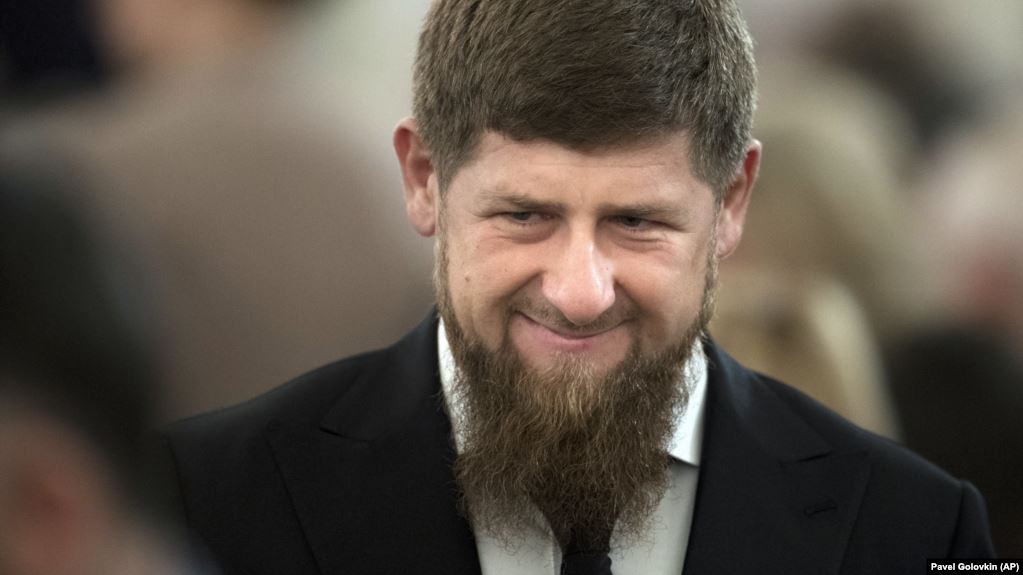
Image Source: Radio Free Europe
Consequently, gay men and the activists attempting to help them are both being punished by the state, often under false accusations. One Chechen human rights activist, Oyub Titiev, was kept in prison for one and a half years starting in 2018. Mounting pressure from international rights organizations like the UN and Amnesty International resulted in his release and parole.
What was Titiev’s initial charge? Drugs found in his car during a routine traffic stop – that he claims were planted by police. He was sentenced to four years in prison for drug possession. Being the head of the Chechen office for the Memorial Human Rights Center, many suspect Kadyrov and his government are behind these false accusations in order to remove Titiev from his work, exemplifying Kadyrov’s growing distaste for activists.
Unfortunately, Kadyrov’s actions aren’t just confined to Chechnya. Movsarv Eskarkhanov, a gay Chechen man seeking asylum in Europe, described in an interview with Time Magazine about an incident in eastern Germany, where he was confronted by three Chechen men in his hotel room. One was wearing a mask and carrying a long knife. When Eskarkhanov opened the door, his first thought was, “They’ve come to kill me.”
‘Chechen death squads’, as an article in The Guardian referred to them, can be found in countries like Germany, Poland, and other European Union countries. Ayub Abumuslimov, whose brother was kidnapped by the Chechen government and most likely executed, fled with his family towards Europe, eventually making it to Poland. While waiting for their papers to process, Abumuslimov received a call from a Russian phone number. A Chechen voice was the speaker. “You thought we won’t find you in Poland? We’ll find you anywhere.”
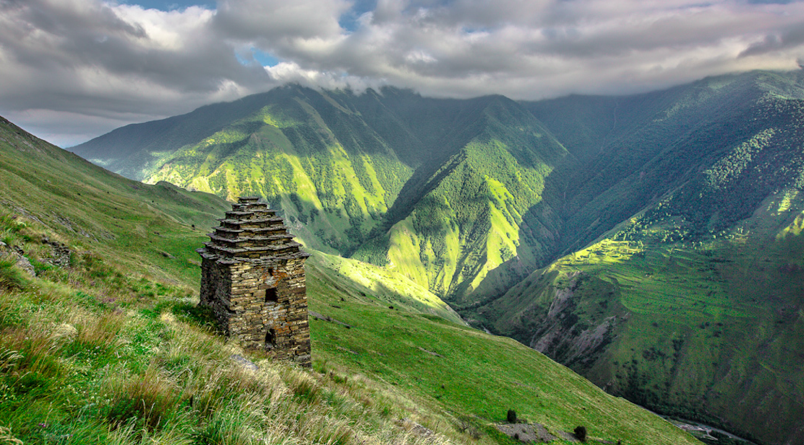
Image Source: Russia Travel Advisor
The implications of Eskarkhanov and Abumuslimov’s experiences are concerning. In short, the Chechen population inside Europe is able and willing to continue the purges that Kadyrov has started. Kadyrov’s influence on his own people beyond state lines is a cause for concern, and that combined with Russia’s growing presence on the international stage begs the question of what the future will look like for other regions that may come under Putin or Kadyrov’s rule in the near future.
Why this matters now
Just this week, after the withdrawal of American troops in parts of Syria, the Russian government announced its plan to fill these vacancies with troops of their own. With direct influence now in Syria, Putin has successfully expanded his domestic power in Russia to further power abroad.
According to the Carnegie Endowment for International Peace, Putin knows exactly what he’s doing: “Russia’s agenda is straightforward: to assert its influence at the expense of Washington and the rules-based international system… Where the United States and its allies have pulled back or failed to deliver, Russia has eagerly stepped in.”
With this plan, Putin’s influence will only continue to grow. After the successful annexation of Crimea in 2014, Putin began to take an offensive rather than a defensive strategy towards international order. Russian involvement in Syria began around this time, and it has since made further deals with countries like the United Arab Emirates and Qatar.
Further Russian expansion will continue to place more people under Moscow’s rule, and therefore subject them to the conservative policies mentioned before. Failure to acknowledge both homophobic Russian policies and expanding Russian power can and will result in another case like Chechnya, where many, many more innocent people will be persecuted.
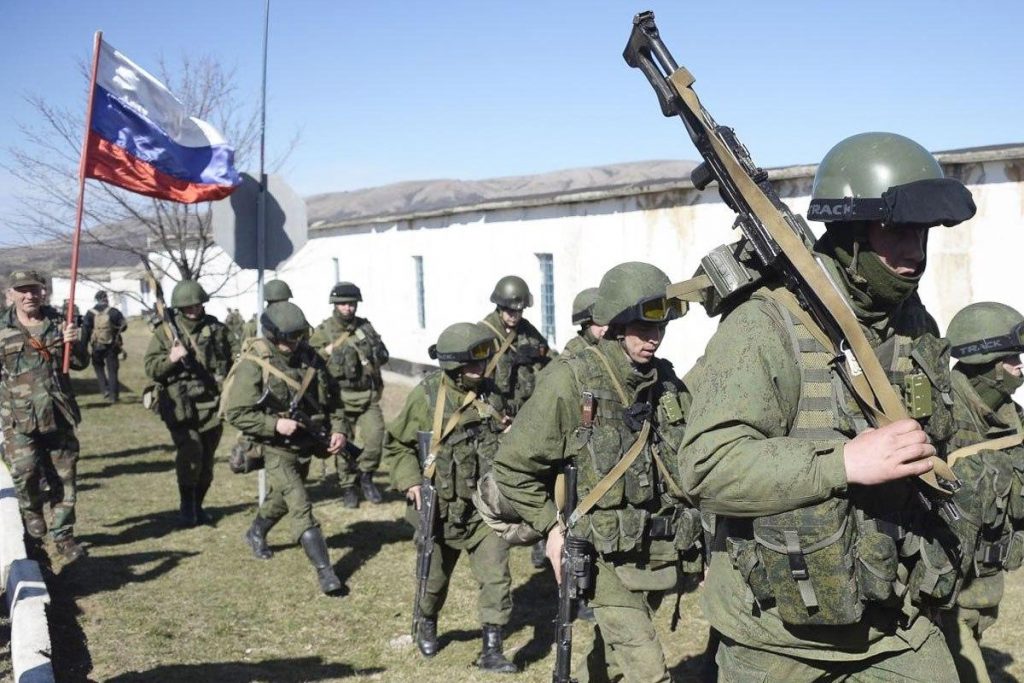
Image Source: Middle East Monitor
The international community
The role of the international community is to force Putin’s government to address and fix its wrongdoings. The United Nations has already issued statements on the human rights abuses in Chechnya, and other human rights groups like Human Rights Watch have released reports as well.
However, the lack of acknowledgment from major powers like the United States have allowed Putin and Kadyrov to continue their terror. Chad Griffin, the president of the Human Rights Campaign, wrote a letter to President Trump in 2018 urging him to speak about the issue himself:
There is much more that needs to be done. None of the perpetrators have been brought to justice. Russia has refused to launch an investigation, and those who carried out these abuses face no repercussions for their actions. Their impunity is especially problematic: since there are no consequences for their actions, others could be led to believe that they too will receive no punishment should they choose to do the same.
In short, condemnations from international leaders, including President Trump, are vital for the future of gay individuals in Chechnya and beyond. Economic sanctions also play a role, and in combination with international pressure, can result in reluctant, but progressive, steps from Moscow.
However, without acknowledgement and pressure from official state actors, Putin will continue to expand and enforce his policies, a trend he seems to be a fan of for the last five years. Kadyrov will remain untouched, Russian laws will continue to become more conservative, and thousands more will suffer.
Chechnya is a strong state, and the Chechens are strong people. As seen from the brutal conquests throughout history, they always seem to fight their way back. But now, it is time for the international community to take notice of their suffering and reach out with a helping hand. If we don’t, no one will.
Featured Image Source: Time Magazine
A well-written first article I’ve read by RICS – thank you for shedding light on this situation in Chechnya.
Edda says:
October 29, 2019
Very informative and well written article. Very sad to read that persecution of gay people (not exclusive to Chechnya ) is still happening in the 21st Century, One wonders why?
Very informative and sad. Thank you for broaching the subject.
I’m not that much of a internet reader to be honest but your blogs really nice, keep it up!
I’ll go ahead and bookmark your site to come back in the
future. Cheers